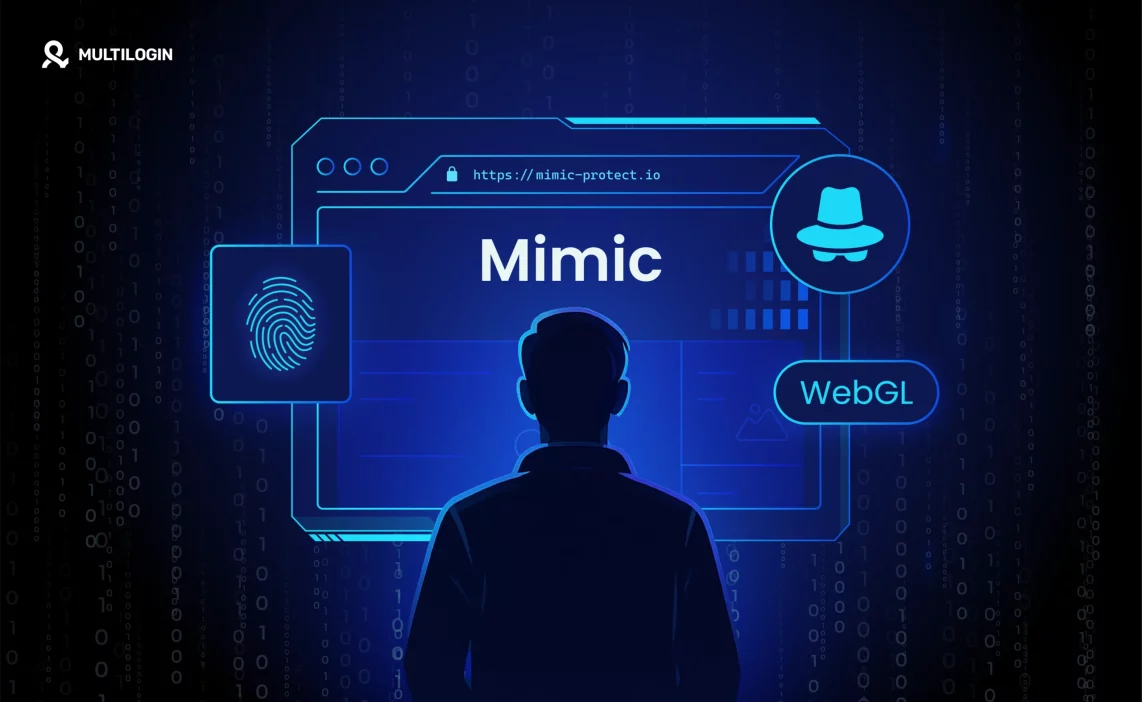Managing multiple accounts online becomes risky when environments overlap. Shared browser data, repeated fingerprints, or inconsistent sessions often lead to silent account linking and sudden bans. Mimic browser is Multilogin’s Chromium-based antidetect browser built to keep each browser account isolated and stable.
As more platforms move activity into native mobile apps, browser protection alone is no longer enough. Multilogin extends the same isolation to mobile workflows using Android cloud phones, so both web and mobile accounts stay separated and manageable from one dashboard.
What this setup gives you
- Isolated browser profiles with Mimic browser
- Dedicated Android cloud phone for each mobile account
- Persistent sessions for both browser and mobile workflows
- One dashboard to manage web and mobile accounts together
What is Mimic browser
Mimic browser is a Chromium-based antidetect browser built to help you manage multiple web accounts without them bleeding into each other. Instead of opening accounts in the same browser and hoping nothing overlaps, Mimic gives every account its own isolated browser profile with its own data, settings, and session history.
It exists because regular browsers were never designed for multi-account work. When you log in and out of accounts in Chrome or any standard browser, traces stay behind. Cookies, local storage, cached data, and subtle browser signals build up over time. That overlap is exactly what platforms use to connect accounts. If you get banned, this is usually where the problem started.
With Mimic browser, each account runs inside a separate environment. Browser fingerprints are controlled per profile, session data stays consistent, and activity in one profile does not affect another. You are not switching accounts inside the same setup. You are switching environments entirely, which is a very different thing.
The difference becomes clear once you have dealt with bans. In a regular browser, accounts share history even when you think they do not. In a profile-based environment, each account starts, runs, and pauses on its own terms. If an account is restricted, it does not drag others down with it. That separation is what keeps multi-account workflows stable over time.
How browser environments affect account stability
Websites do not judge accounts based on a single login or action. They compare data across sessions and over time, looking for patterns that suggest multiple accounts are being run from the same environment. When browser setups are reused, even small similarities start to add up, and that is when accounts begin to lose stability or get restricted without a clear explanation.
What websites compare across sessions
- Browser fingerprints and configuration details
- Stored cookies and local session data
- Screen and system settings
- Behavior patterns that repeat across accounts
Why repeated patterns matter
- Similar setups across accounts suggest control by one user
- Reused environments create silent links between accounts
- Flags often appear gradually, not instantly
Long-term impact of shared environments
- Accounts become more fragile over time
- New accounts fail faster than older ones
- One restriction can increase risk for all related accounts
When browser protection reaches its limits
Browser-based protection works as long as platforms evaluate accounts through web signals. Once activity shifts into native mobile apps, the browser no longer controls the environment that matters most. At that point, even well-isolated browser profiles cannot prevent accounts from being judged based on mobile behavior.
Many platforms now guide users toward their mobile apps by limiting features or prioritizing engagement there. Mobile apps collect device-level data that browsers never see, and that data persists across sessions. Logging into multiple accounts from the same mobile setup creates patterns that browser protection cannot reset or hide.
This is where app-level signals take over. Device parameters, app storage, and long-term login history become the reference points platforms rely on. When those signals overlap, accounts get linked regardless of how clean the browser setup looks. That shift is why browser-only workflows stop being enough as mobile usage increases.
Extending account separation to mobile apps
Mobile apps introduce a different layer of risk because they rely on device-level signals that browsers cannot control. When multiple mobile accounts are accessed from the same phone or reused setup, patterns form quickly and accounts get linked. This is why mobile workflows need their own environment, separate from browsers and separate from each other. Android cloud phones solve this by giving each mobile account its own isolated space, where app data, login states, and sessions stay consistent over time without relying on physical devices.
Why mobile workflows need their own environment
- Mobile apps rely on device signals, not browser settings
- Reusing one phone creates shared data across accounts
- App-level checks are harder to reset once flagged
One environment per mobile account
- Each account runs in its own Android cloud phone
- No shared app data between accounts
- Problems in one account do not affect others
Persistent app data and session continuity
- App storage and login states are saved between sessions
- Accounts resume where they left off
- Supports natural account activity over time
Managing mobile accounts without physical devices
- No need to buy or rotate phones
- Launch, pause, and manage accounts from one dashboard
- Scale mobile workflows without changing your setup
If you want, next I can:
- Connect this section directly to Mimic browser logic
- Add a short comparison with browser-only setups
- Prepare a condensed version for SEO snippets
- Write the next section in the same tone
Managing web and mobile accounts from one dashboard
When web and mobile accounts are scattered across different tools, mistakes become easy. You switch tabs, reuse setups, or lose track of which account belongs where. That is usually when accounts start getting linked. Managing everything from one dashboard removes that guesswork and gives each account a clear place to live.
Keeping browser and mobile workflows organized matters more as volume grows. Browser accounts stay inside their own profiles, while mobile accounts stay inside their own Android cloud phones. You see them side by side, know which environment each account uses, and avoid crossing paths that cause long-term issues.
Tool switching is not just inefficient, it is risky. Every extra login, export, or manual step increases the chance of overlap. A single dashboard reduces those touchpoints and lets you scale without turning account management into a juggling act. When an account gets restricted, you can isolate it, adjust the setup, and keep the rest of your workflow running without disruption.
How does Mimic browser work inside Multilogin
Mimic works inside Multilogin as a Chromium-based antidetect browser built for running multiple web accounts without overlap. Each account opens in its own browser profile, with separate data, settings, and session history. You are not logging in and out of accounts in the same browser. You are switching between isolated environments, which is the core difference.
These profile-based environments are what protect account stability over time. Cookies, local storage, and browser signals stay tied to one profile only. When one account runs into trouble, it does not pull others with it. This structure matters when bans happen quietly and only after patterns have formed across sessions.
Multilogin also includes Stealthfox as an alternative browser core for cases where a Firefox-based environment is needed. Having two browser engines gives you flexibility without changing tools or workflows. Some platforms behave better on Chromium, others expect Firefox, and Multilogin lets you choose the right environment while keeping the same rules of separation in place.
Key features inside Multilogin
- Chromium-based Mimic browser for isolated web accounts
- One browser profile per account with separate session data
- Persistent cookies and local storage per profile
- Stealthfox available as an alternative browser core
- Ability to choose the browser engine based on platform needs
- Unified management of all browser profiles in one dashboard
How Android cloud phones support mobile account separation
Mobile apps rely on device-level signals that browsers cannot isolate. When multiple accounts are accessed from the same phone or reused setup, shared data builds up quickly and accounts get linked. Multiloginn Android cloud phones prevent this by giving each mobile account its own environment, where app data, login states, and session history stay separate over time.
Each account runs inside its own Android cloud phone, not alongside other accounts. You can pause sessions, return later, and continue without resetting the setup or starting from scratch. This makes mobile workflows more predictable and easier to manage, especially when platforms depend heavily on native apps.
How Android cloud phones keep mobile accounts separate
- One Android cloud phone per mobile account
- No shared app storage or login data between accounts
- Persistent sessions that resume where you left off
- Native Android apps running in isolated environments
- Mobile accounts managed without physical devices
Built-in proxies and location consistency
Account stability depends on consistency, not just isolation. When IP addresses, locations, and environment signals do not line up, platforms notice. Switching locations too often or mixing browser and mobile signals from different regions is one of the fastest ways to raise flags, even when accounts are otherwise separated.
Built-in proxies help keep browser and mobile environments aligned. When location, IP, and environment data follow the same logic across sessions, accounts behave more predictably. This matters even more when you manage both web and mobile accounts, where mismatched signals can quietly connect accounts over time and lead to restrictions that are hard to trace back.
Why location consistency matters
- IP and location data should match the environment being used
- Browser and mobile accounts need consistent regional signals
- Sudden location changes increase account risk
- Mismatched signals often cause gradual restrictions, not instant bans
Ready to experience stealth like never before? Get Control With Multilogin
Conclusion: You can’t stay private without it
Managing multiple accounts stops working when environments overlap. Reused browser setups, shared session data, or mixed mobile signals slowly connect accounts and lead to restrictions that are hard to undo. Mimic browser addresses this at the browser level by giving each web account its own isolated environment with consistent session data.
As platforms move more activity into native mobile apps, browser protection alone is no longer enough. Android cloud phones extend the same separation to mobile workflows, keeping app data, login states, and sessions independent for each account. Together, Mimic browser and Android cloud phones create a clear structure for managing web and mobile accounts without relying on workarounds or constant resets.
The result is not tricks or shortcuts, but stability. One account, one environment, managed from one dashboard. That structure is what supports long-term account health as workflows grow.
Frequently asked questions about Mimic browser
Mimic browser is used to manage multiple web accounts without them interfering with each other. Each account runs in its own browser profile with separate data and session history, reducing the risk of account linking and unexpected bans.
Mimic browser is designed for web-based platforms. When work moves into native mobile apps, Android cloud phones are used instead. This keeps browser and mobile accounts separated while managing both from the same platform.
Mimic is a Chromium-based antidetect browser developed by Multilogin. It allows users to control browser fingerprints and browse the web undetected.
While it looks and performs like Chrome, Mimic prevents fingerprint tracking and disables Google’s telemetry. It also lets users create custom fingerprints per profile.
Mimic is included in all Multilogin pricing plans at no extra cost.
Yes, Mimic is compatible across operating systems and automatically adjusts timezone and OS-specific fingerprinting variables.



